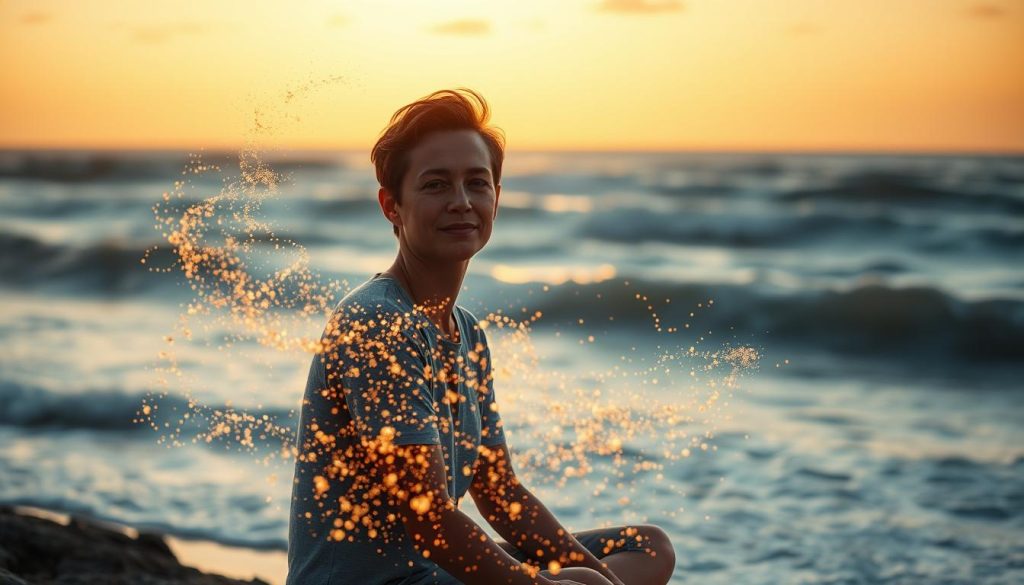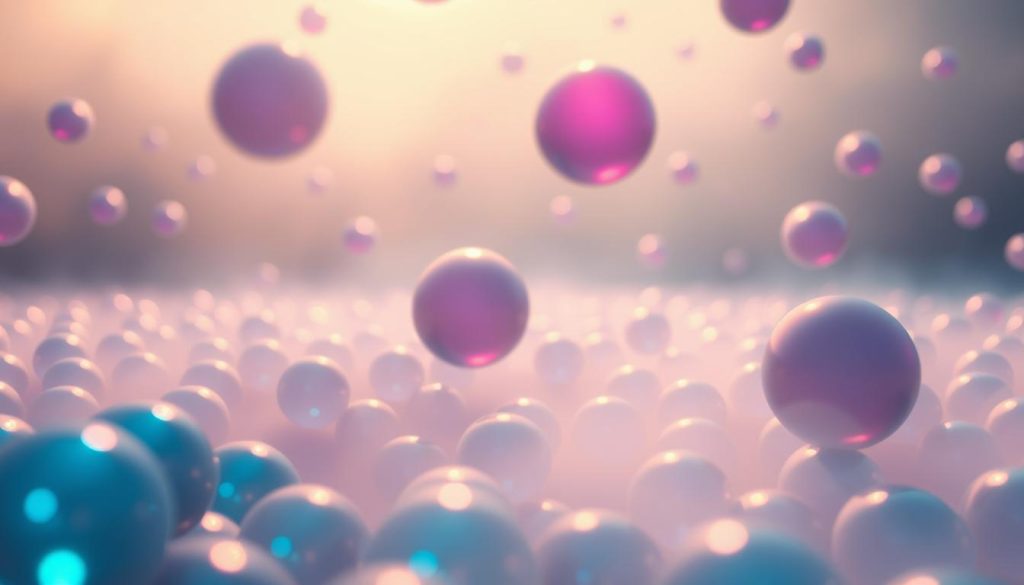Ever felt refreshed after walking by the sea? It might be the ocean air and negative ions. These particles around the ocean bring many health benefits. They help with mental health and breathing, making the therapeutic beach air more than just cool.
Research shows the big ocean air benefits. It shows how negative ions health is improved. This section is just the start of exploring how these ions and the sea’s air boost our health. Let’s learn more about how being near the ocean can make us healthier.
Introduction to Negative Ions
Negative ions are molecules that gain an electron, making them negatively charged. This process is key to many natural processes and offers health benefits. They are common in places like mountains, waterfalls, and ocean air. Learning about negative ion exposure helps us see their health benefits.
Negative ions mainly come from nature. For instance, during thunderstorms, rain, and near waterfalls, the air is full of these ions. Ocean waves also create a lot of negative ions. When we’re exposed to them, our bodies can enjoy better air quality and healing effects.
The Science Behind Ocean Air
Ocean air is special because of its unique mix of elements. This mix helps create negative ions. Knowing about these elements can tell us how ocean air is good for our health.
Composition of Ocean Air
Ocean air is made up of salts, water droplets, organic compounds, and trace elements. These come from the seawater into the air through waves and wind. The air also gets salty from sodium chloride and other minerals from the ocean.
When water evaporates, these salts stay in the air. They add natural ions to it.
How Ocean Air Produces Negative Ions
Negative ions in sea air come from sunlight, wind, and waves. When waves crash and bubbles pop, they release lots of negative ions. The sun’s UV rays also add energy to the air, making more negative ions.
This process of interaction between nature’s forces explains why there are so many negative ions by the sea.
| Factor | Mechanism | Contribution |
|---|---|---|
| Ocean Waves | Break up water molecules | Increase in negative ions |
| UV Sunlight | Energy absorption and particle transformation | Boosts ion generation |
| Wind | Disperses particles | Spreads negative ions across larger areas |
Benefits of Negative Ions on Mental Health
Being around negative ions can greatly improve your mental state. They help reduce symptoms of depression and anxiety. Studies show that negative ions calm the brain, leading to better mental health and relaxation.

For those with mood disorders, ion therapy for depression is a natural, side-effect-free option. Being in places with more negative ions, like near the ocean, can boost mood and mental health.
Research shows that negative ions can raise serotonin levels. This is key for managing mood. As we learn more about psychological effects of negative ions, using them for mental wellness becomes more important.
Respiratory Health and Fresh Ocean Air
Spending time by the sea can greatly improve your respiratory health. The fresh ocean air is full of negative ions. This can help improve your breathing quality.
The sea breeze is calming and cleanses your respiratory system. It can offer relief to those with asthma.
Breathing Easier by the Sea
Fresh ocean air can make breathing easier. The sea air is clean and free from city pollutants and allergens. This is great for people with asthma.
The ocean’s negative ions help a lot. They allow for deeper and easier breaths.
Negative Ions and Allergies
Ocean air is full of negative ions, which help allergy sufferers. These ions clear the air of pollen and dust. These are common allergy and asthma triggers.
A day by the sea can be relaxing and improve your breathing. It’s thanks to the natural ionization processes.
Ocean Air and Negative Ions
Breathing in ocean air combines elements that may boost health. The seaside’s therapeutic benefits come from negative ions in the air. These ions are made by waves crashing onshore.
Studies show that negative ions improve health. They can make you feel better, reduce stress, and boost overall wellbeing. The seaside’s air, rich in negative ions, helps you relax and think clearly.
Ocean air’s negative ions are good for your lungs. People by the sea often breathe easier and feel better. These ions clear your airways and lower inflammation, showing the seaside’s health benefits.
- Improved overall mood and mental clarity
- Reduction in stress levels and increase in relaxation
- Enhanced respiratory health and easier breathing
The link between ocean air and negative ions shows the seaside’s health benefits. These benefits are not just stories. They are backed by science, showing how negative ions improve health.
Enhancing Sleep Quality with Sea Breeze
Imagine the gentle whisper of the sea breeze and sleep that feels truly restorative. Many coastal communities seem to experience improved rest thanks to the unique properties of ocean air. The interplay between negative ions for better sleep and the tranquilizing effects of sleeping by the ocean can create a perfect environment for deep slumber.

The sea breeze is naturally rich in negative ions. These ions have been shown to enhance serotonin production in the brain. This neurotransmitter is crucial for mood regulation and achieving a deep, restorative sleep. People often say that the soothing sound of waves and the invigorating negative ions help them sleep better.
Let’s take a closer look at the possible physiological reasons behind these benefits:
| Factor | Effect on Sleep |
|---|---|
| Negative Ions | Boost serotonin levels, improving mood and relaxation |
| Sea Breeze | Regulates body temperature and ensures a comfortable sleeping environment |
| Sound of Waves | Acts as a natural white noise, blocking disruptive sounds and promoting deep sleep |
Given these elements, it’s not surprising that exposure to the sea breeze can significantly enhance sleep quality. Beyond anecdotal evidence, which supports this beneficial relationship, scientific studies continue to explore the exact mechanisms through which negative ions for better sleep are facilitated by ocean air.
In summary, the synergy between sea breeze and sleep is not only refreshing but also scientifically supported. Embracing the natural environment by sleeping by the ocean can lead to improved sleep quality. This helps you wake up rejuvenated and more energetic.
Using an Ionizer for Indoor Air Quality
Using air ionizers can greatly improve indoor air quality. These devices make your home feel like it has ocean air, full of negative ions. We’ll explain how ionizers work and help you choose the right one for your home.
How Ionizers Mimic Nature
Ionizers create negative ions by sending out an electrical charge. This is similar to what happens in ocean waves and waterfalls. By doing this, they help clean the air by making particles fall out of the air.
Choosing the Right Ionizer
Choosing the right ionizer involves a few steps. First, think about what you need for your home. Consider the size of the area and any air quality issues, like allergens or bad smells.
Look at the features and read what other users say. This helps make sure the ionizer will meet your needs for clean air.
- Room Size: Make sure the ionizer fits the space you want to clean.
- HEPA Filtration: Some ionizers also have HEPA filters for better air cleaning.
- Noise Levels: Choose one that’s quiet to keep your home peaceful.
- Energy Efficiency: Look for ones that save energy to cut down on costs.
By focusing on these points, you can get the most out of air ionizers and make your home healthier.
Wound Healing and Negative Ion Therapy
Recent studies have shown that negative ion therapy can greatly help in healing wounds faster. Negative ions, found in places like the beach, have been found to reduce healing time and fight off infections. This is based on various research findings.
Negative ion therapy is becoming more popular in medicine. It helps by reducing swelling, improving blood flow, and fixing damaged cells. This method is natural and doesn’t hurt, making it a good option for quick recovery.
Exposure to negative ions can make wounds heal faster and lower the risk of infections. People have seen their healing times get shorter and felt less pain and swelling. This has made their recovery process much easier.
The body reacts well to negative ion therapy by making cells that fix tissues work better. This method strengthens the immune system, helping wounds heal faster and better. As we learn more about negative ion therapy, it could change how we treat wounds in medicine.
Mood Enhancement and Stress Reduction
Negative ions can make us feel better and help us relax. Studies show they boost serotonin levels. This helps us feel emotionally well.

Uplifting Mood with Negative Ions
Negative ions can make us feel happier. They fight off harmful free radicals and boost brain oxygen flow. This makes us more alert and clear-minded.
People near the ocean often feel calm and refreshed. They say it’s because of the negative ions in the sea air.
Relieving Stress Naturally
Negative ions are great for stress relief. They work with our body’s chemistry to lower cortisol levels. This hormone is linked to stress.
By balancing our emotions, negative ions reduce tension and anxiety. Fresh ocean air and negative ions together are a natural way to feel clear and relaxed.
Natures Air Purifier: Negative Ions
Negative ions act as nature’s air purifier, removing pollutants and allergens from the air. These ions attach to harmful particles like dust, pollen, and smoke. This makes them fall to the ground, leaving the air cleaner.
This process greatly reduces airborne pollutants. It leads to remarkably clean air in areas with lots of negative ions.
Many studies show the good effects of negative ions on air quality. Places like forests, mountains, and beaches have lots of negative ions. They work hard to make the environment healthier by removing contaminants.
By understanding negative ion effects, we can use natural air purification methods. This helps keep the air indoors and outdoors cleaner and fresher.
Here’s how negative ions help keep the air clean:
- Reduction of Dust: Negative ions bind to dust particles, causing them to settle out of the air.
- Minimizing Allergens: These ions also attach to allergens like pet dander and pollen, reducing their presence in the air.
- Neutralizing Smoke: Smoke particles are heavier when bonded with negative ions, helping in their removal from indoor environments.
In essence, the natural air purification process driven by negative ions ensures clean air. It also supports a healthier living space. This is free from common pollutants that can harm our respiratory and overall health.
Boosting Energy Levels with Fresh Ocean Air
Feeling the rush of negative ions in the ocean breeze is refreshing. It boosts both your body and mind. The mix of ocean air and negative ions is truly uplifting.
Feeling Energized by the Sea
Being near the sea makes you feel more alive. This is thanks to the sea’s high negative ion levels. Many say they feel more awake and full of life after a beach visit.
Negative ions help your brain get more oxygen. This makes you feel less tired and more focused.
Comparing Natural and Artificial Sources
Some people use ionizers to get similar benefits. But natural ocean air is better. It has more negative ions and offers a complete experience.
Being by the sea gives you more than just negative ions. You also get beautiful views and the sound of waves. This makes your experience even better and healthier.
| Aspect | Natural Ocean Air | Artificial Ionizers |
|---|---|---|
| Ion Concentration | High | Moderate |
| Environmental Experience | Holistic (visual, auditory, sensory) | Limited (indoor use) |
| Overall Benefits | Enhanced energy, reduced stress, mental clarity | Improved air quality, some stress reduction |
Ecological and Environmental Impact
Negative ions have many benefits for human health. But it’s also important to think about their impact on the environment. They naturally occur in places like forests, waterfalls, and by the ocean. These areas are known for clean air and overall health.
In cities, where air is often polluted, negative ions can make a big difference. They help cut down on harmful particles and allergens. This makes living spaces healthier for people and animals alike.
Keeping natural places where negative ions are found is key. Coastal areas and forests are good for both humans and the environment. Protecting these places from pollution is crucial. It ensures that future generations can enjoy their benefits too.

